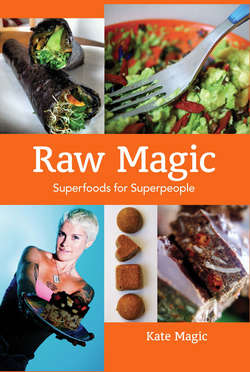Читать книгу Raw Magic - Kate Magic - Страница 16
На сайте Литреса книга снята с продажи.
ОглавлениеPollen
“Bee pollen works, and it works perfectly. Pollen allows superstars to increase their strength and stamina up to 25%. This increase in strength and endurance may be the key to the secret regenerative power of bee pollen. The whole beauty of bee pollen is that it’s as natural as you can get.”
—ALEX WOODLEY, HEAD OF PHILADELPHIA PIONEER CLUB AND COACH TO MANY OLYMPIC GOLD-MEDAL SPRINTERS.
“If the bee disappeared off the surface of the globe, then man would only have four years left to live.”
—ALBERT EINSTEIN
Like algae, bee pollen is a perfect food, in that it contains every single known nutrient that the body needs. Theoretically, if you were stranded on a desert island, you could live on bee pollen and water alone. Pollen is also like algae in that it is a primordial food, one of the oldest foods on this planet, and so it must be made of something pretty amazing to have made it this far. Probably more has been written about pollen than any other food in this book; its incredible healing and rejuve-native properties are well researched and documented. Like all the superfoods, it is the synergistic effect of so many important nutrients that makes pollen so powerful, but it also contains substances as yet unidentified by science that add to its unique magic. Bee pollen is actually a bit of a misnomer because pollen does not come from bees, it comes from flowers, and is collected by the bees and brought back to the hives. Strictly speaking, pollen is not a vegan food, but I personally feel it is unlikely that Mother Nature would have designed the perfect food for humans and not meant us to eat it.
Pollen is a great superfood because it tastes so nice, sweet and rich like honey. Children love it, it is a wonderful food to add to their diets and increase their nutritional intake. It is easy to sprinkle on cereal for breakfast or add to trail mixes and desserts. Pollen has a very “buzzy” energy; it is sometimes called natural speed. I remember the first time I took it; it was about 10 p.m. at night, I had just put two children to bed, I was home on my own, and didn’t know how I was going to face the rest of the evening’s chores, tidying the kitchen and sorting out the washing. I took two pollen tablets to get me through those last few hours, and ended up with enough energy afterwards to dance around the living room! Pollen is a great food if you are always on the go, flitting from one activity to the next like a bee flying from flower to flower. If you are eating a meal that is a quick stopgap, with no time to rest or think, then adding pollen to it gives you that boost to rush off, full of enthusiasm and energy, rather than dragging yourself on feeling tired and reluctant.
The quality of bee pollen can be quite variable, and depends a lot on where it is gathered. Ideally, the environment in which the flowers and bees are living should be as pristine as possible, which is why desert pollen is very good. At one of the world’s largest pollen producers, workers drive around the land in electric cars so as to minimize pollution. As a fresh food, pollen goes rancid easily. If it is kept in packaging that exposes it to light for long periods of time the quality can deteriorate. It also doesn’t like being exposed to heat so it is best kept refrigerated. You can tell if it is past its best by putting pollen granules in a glass of water—if it floats, it’s rancid. The majority of pollen that is sold in the West is dried—if you can find fresh pollen it’s really in a class of its own. Look out for the French Percie du Sert pollen that is sold frozen to preserve it. Pollen also goes off quickly when it is ground up, so if you are adding it to recipes, better to use it in its whole form, unless you are planning on eating it straightaway. Most commercially available pollen is polyfloral, i.e. it comes from more than one variety of flower. Monofloral pollen is made when the bees collect pollen from one type of flower only, linden or hawthorn for example. Monofloral pollens have quite distinct tastes, and act on specific physical and energetic areas according to the flowers that they are from; for example, linden pollen is calming for the nerves, hawthorn nourishes the heart. The most beneficial pollen is that which is sourced locally to you, because then it is helping your body to tune into its immediate environment.
